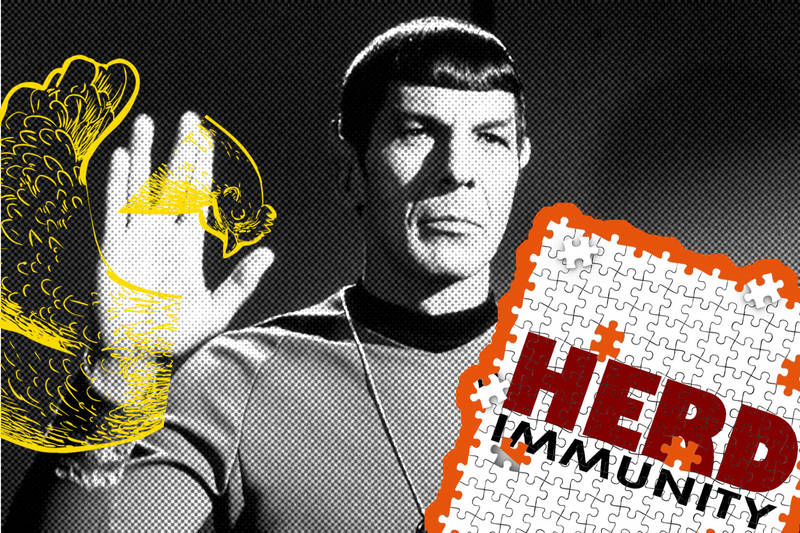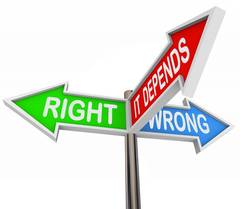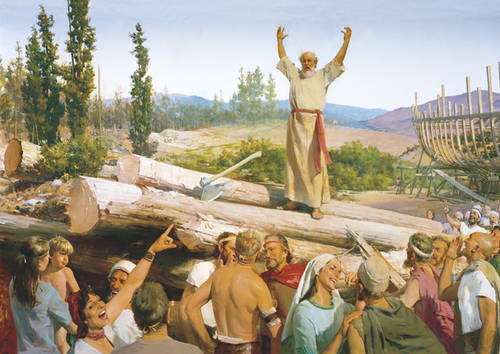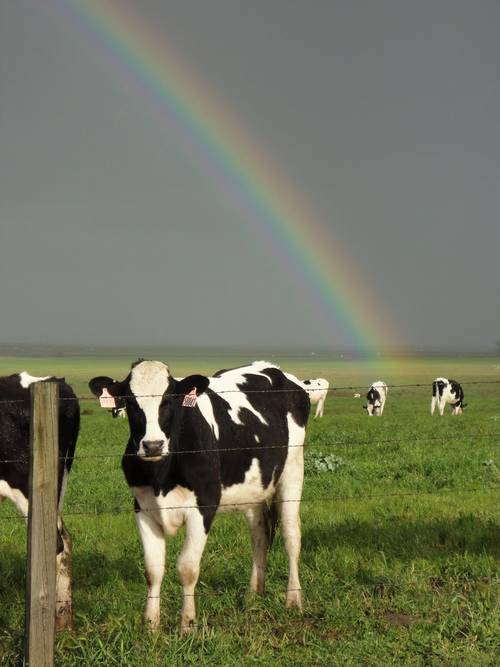Torah On the Grow, a periodic blog by Rav Shai Cherry
01/31/2020 12:00:46 PM
Not everyone has the luxury, or patience, to learn Torah every week. Torah on the Grow is for that audience. The goal is to bring a Jewish perspective to topics that surround us in our non-Jewish environment. The hope is to grow in our Jewish knowledge, in our appreciation of Jewish wisdom, and in our desire to learn more. – Rav Shai Cherry
To receive the periodic posts in your mailbox, click here to subscribe.
Mr. Spock, Chicken Heads, and Herd Immunity
01/16/2020 11:39:01 AM
 Maimonides describes a situation where a dad wants to give his son a toy to keep him distracted. He looks around, and all he sees is a chicken. So, he cuts off the chicken’s head and gives it to his son to play with.
Maimonides describes a situation where a dad wants to give his son a toy to keep him distracted. He looks around, and all he sees is a chicken. So, he cuts off the chicken’s head and gives it to his son to play with.
What’s the problem Maimonides is illustrating in this case of premeditated decapitation? Shabbat. Although the Talmud sees nothing inherently wrong with cutting off animal heads on Shabbat, assuming the animal is yours, it is forbidden to kill an animal on Shabbat. Thus is born the Talmudic principle of: p’sik reisha v’lo yamut? (Can you cut off the head and it not die?)
Acts have consequences. When the consequences are inevitable, even if the acts are permitted, Jewish law holds you liable for the act. The problem isn’t burning coal or eating meat, the problem is the inevitable consequences of those actions to our global environment. Choosing to leave your children unvaccinated to avoid their personal risk of exposure to live antibodies might be permissible. But if too many parents opt out of vaccinations, we will lose herd immunity. Then all kids will be at risk. It is unavoidable, like the chicken dying once its head is cut off.
In a collection of rugged individualists, personal choice might be tolerated regardless of its consequences. But Jewish ethics requires us to be responsible for our brothers and sisters — All Israel is responsible for one another (b. Shevuot 39a). If the consequences of our individual acts will be to the detriment of others, those acts are forbidden. Mr. Spock (and John Stuart Mill [1806-73]) had a similar principle: the good of the many outweighs the good of the few.
Nothing New Under the Sun
12/19/2019 11:45:22 AM
 Although Moses’ cousin, Korah, did attempt a coup d’état, it is King Saul who has the distinction of being the first deposed leader of the Israelites. His crime? Abuse of power. When waging war against the nasty Amalekites, rather than following divine orders and putting to the sword all the enemies’ livestock, King Saul spared the sheep and oxen for his own personal interest. He spared the King, too. (Apparently, he liked other monarchs.) When confronted by the prophet, rather than immediately admit his transgression (as King David was later to do), King Saul lied. One of my teachers, Reuven Kimelman, said that the role of the prophets has now been assumed by the fourth estate, the free press.
Although Moses’ cousin, Korah, did attempt a coup d’état, it is King Saul who has the distinction of being the first deposed leader of the Israelites. His crime? Abuse of power. When waging war against the nasty Amalekites, rather than following divine orders and putting to the sword all the enemies’ livestock, King Saul spared the sheep and oxen for his own personal interest. He spared the King, too. (Apparently, he liked other monarchs.) When confronted by the prophet, rather than immediately admit his transgression (as King David was later to do), King Saul lied. One of my teachers, Reuven Kimelman, said that the role of the prophets has now been assumed by the fourth estate, the free press.
Can the prophet/press sometimes become overzealous? Absolutely! The prophet whom we anticipate welcoming in the messianic days is Elijah. He was discharged from his duties because of his intolerance for the necessary compromises of our messy world. Only in the coming world, when our messiness will have been mitigated, will Elijah be comfortable enough to return.
Democrats charge Trump with abuse of power; most Republicans argue that his crimes don’t rise to the level necessary for impeachment. God regretted that He had made Saul king, but God also fired Elijah for being zealous for the Lord. As the winter solstice approaches, we search in vain for something new under the sun.
Don't Let Theology Interfere with Ethics!
12/12/2019 11:51:26 AM
 Why be good? In the Torah, although there were various mechanisms, good deeds paid off in terms of national security. Indeed, there were periods of biblical history when the Israelites did enjoy national security.
Why be good? In the Torah, although there were various mechanisms, good deeds paid off in terms of national security. Indeed, there were periods of biblical history when the Israelites did enjoy national security.
B’yamim hahem bazman hazeh, but at about this time of year, nearly 2,200 years ago, this world (olam hazeh) was looking bleak for the Jews. We were being murdered for just doing our own thing: circumcision, Torah, and Shabbat. The biblical link between our actions and our rewards was severed. Since olam hazeh seemed inexplicably miserable, given our piety, rewards were projected onto a different dimension: olam haba, the coming world.
A group of Jews who became known as the Pharisees offered a new way of reading Torah that included a new venue to reward a righteous life. The Book of Second Maccabees, a product of Hellenistic Judaism, features the first Jewish martyrs
imagined to have been resurrected to eternal life. Immortality of the soul, another post-biblical idea, takes root during this period, too.
As an historian of ideas, I nod in assent when people ask if Judaism believes in bodily resurrection and immortality of the soul — “rewards” that are in tension with one another. (One is pro-body, the other is pro-soul.) But as a rabbi, I qualify my nod and say that not all Jews believe such notions. The Mishna punishes anyone who says there is no olam haba by denying them admission!
My teacher, Elliot Dorff, emphasizes that whatever we believe about resurrection, we are still obligated to donate our organs upon death. His point is that we can’t allow theology to get in the way of ethics. As the Torah teaches, the best path to
whatever lies ahead is righteous attentiveness to the here and now.
Principles, Consequences, Democracies, and Hanukkah, Too
12/05/2019 11:55:44 AM
 Without going too far out on the limb of speculation, the majority of American Jews would prefer Trump impeached and removed from office. On the other side of that same tree, the majority of Israeli Jews would prefer Trump serve a second term.
Without going too far out on the limb of speculation, the majority of American Jews would prefer Trump impeached and removed from office. On the other side of that same tree, the majority of Israeli Jews would prefer Trump serve a second term.
When the Greek empire held sway in the Middle East, Africa, and Europe, the Seleucids of Syria attempted to impose Greek religion on the Jews of Judea. Although some Jews were quite happy to trade Judean particularism for Greek cosmopolitanism, others refused. Those refuseniks, the Maccabees, engaged in such immoral behavior, the Rabbis later
refused to permit their story to enter the canon of our sacred texts.
We think of the Hanukkah war as being waged against the Seleucids, but Mattathias’ first victim was a Jewish neighbor about to sacrifice to a foreign god. Mattathias murdered him in cold blood. The Mishnah explicitly prohibits murdering someone to stop them from engaging in idolatry. Thus, when I charged Mattathias with murder, I was channeling the Rabbis.
Here’s the thing: had Mattathias NOT murdered that Jew and initiated the war against other Hellenizing Jews and the Seleucids, the Rabbis might never have emerged. Judaism would have atrophied to the point of extinction in the name of universalism. But, in the wake of the Maccabean victory, governmental corruption became systemic. Ultimately, 235 years later, the Romans destroyed our seat of power in Jerusalem and ushered in nearly two thousand years of statelessness.
Civil war in Hebrew is milchemet achim, a war between brothers. As we deliberate about the future of American and Israeli democracy, let us not forget the Talmudic lesson of Kamtza, bar Kamtza, and the Temple’s destruction: do not neglect likely consequences in single-minded pursuit of principle.
The Blessings of Torah
11/21/2019 12:00:08 PM
When one studies Torah, one comes to know the mind of God, as it says, “Then you will understand the fear of the Lord and attain knowledge of God” (Proverbs 2:5).
-- Avot d’Rabbi Natan 4:1 (3rd c.)
 There is, to be blunt, no understanding the Rabbinic Revolution without understanding this midrash.
There is, to be blunt, no understanding the Rabbinic Revolution without understanding this midrash.
Assume for the moment that you could know the mind of God. What else could compete? The prerequisites to knowing the mind of God don’t depend on being of priestly descent. Nor does knowing the mind of God require wealth. The revolutionaries removed the bouncers from the entrance to the Beit Midrash (study hall); Torah study was accessible to all, even (theoretically) women. No wonder Torah was compared to drugs — with such access to the divine mind, how could anyone not become addicted?
The weapon of the Rabbinic Revolution was midrash, the process of removing biblical words from their context and transplanting them into another context. In the biblical verse cited above from Proverbs, knowledge of God meant knowing something about God. Within the new Rabbinic context, our midrash cites the verse to prove that studying Torah allows us to attain knowledge of God, i.e., God’s own knowledge! Thus by studying Torah one comes to know the mind of God.
That’s the allure of studying Torah, and it was on full display last week in AJ’s Beit Midrash. Bruce Lipton suggested, on the basis of this midrash, that when we study Torah it frightens God because of the insights we glean into the divine mind. The fear of the Lord is not the fear that we have of the Lord, but the fear that the Lord has of our human potential for good and evil and our fallibility in putting that knowledge to use. The blessing of Torah is that the more we study together, the more likely we will be to assuage God’s fears.
Be a Bosom Buddy
11/14/2019 12:04:51 PM
For what may have been my earliest talent show, I sang a song from “Mame” that was then on my Mom’s playlist: “Bosom Buddies.” As an eight-year-old, I’m not sure I even knew what a bosom was. But Lucy and Maude (Lucille Ball and Bea Arthur) made whatever it was funny. Here’s the crescendo:
| Just turn to your bosom buddy For aid and affection For help and direction For loyalty, love, and for sooth! Remember that who else but a bosom buddy Will sit down and level And give you the devil Will sit down and tell you the truth! |
My tribal pride hopes that Jerry Herman, the composer and lyricist, learned this lesson in Torah School. First comes loyalty, then sooth. In Abraham’s confrontation with the King of Gerar, the King asks Abraham to swear an oath of loyalty (chesed) to establish a peace pact between the two peoples. Abraham swears (Gen. 21:21). Literally, the Torah’s very next word is one of rebuke. Only when Abraham and the King enjoy a relationship based on mutual commitment can Abraham “sit down and level” with the King that his royal servants had misappropriated what rightly belonged to Abraham. First loyalty, then sooth.
What “Mame” (and Abe) taught me is that to be a bosom buddy means to be able to give and take constructive criticism. What Torah commands us is to actually give and take constructive criticism. True friends do not let others stray from being their best selves. “Do not hate [the deeds of] your buddy in your bosom-criticize constructively!” (Lev. 19:17)
Noah and Kristallnacht
11/07/2019 01:13:29 PM
In the space of a week, we have elections, impeachment hearings, Veterans Day, and the 81st anniversary of Kristallnacht. And, lest we forget, there is the ongoing wrangling to form a government coalition after the second Israeli elections this year. Let’s return to simpler times.
 According to the Rabbis, the first thing Noah did once he got God’s call to build the ark was to plant cedar trees. He spent the next 120 years waiting for those cedar trees to grow to the proper dimensions for the ark. During those 120 years, Noah spread the word, sounded the alarm, and wrote on the wall. Not one soul heeded the warnings. Then the animals came aboard. Didn’t anyone find it strange to see all those creatures crawl, lumber, trot, and fly onto the barge? Still, no one asked to join them on the ark. Too uncomfortable, I suppose.
According to the Rabbis, the first thing Noah did once he got God’s call to build the ark was to plant cedar trees. He spent the next 120 years waiting for those cedar trees to grow to the proper dimensions for the ark. During those 120 years, Noah spread the word, sounded the alarm, and wrote on the wall. Not one soul heeded the warnings. Then the animals came aboard. Didn’t anyone find it strange to see all those creatures crawl, lumber, trot, and fly onto the barge? Still, no one asked to join them on the ark. Too uncomfortable, I suppose.
In 1932, Germany held two national elections. After the second, in order to cobble together a government coalition, Hitler was offered the Chancellorship. In the aftermath of the 1933 Reichstag Fire, Hitler legally suspended civil liberties for all Germans. The cedar seeds were planted. Anti-Jewish legislation then marched on unimpeded. By November of 1938, German Jews had experienced what historians call “social death” as a result of their banishment from non-Jewish German society. Kristallnacht was the next stage, the clear-cutting of the cedar forest. For a variety of understandable reasons, roughly a third of 1932’s German Jews remained even after Kristallnacht and were murdered.
As we honor the veterans who risked the ultimate sacrifice to protect our lives and lifestyles, let us pledge to risk discomfort to defend our values and principles. How many warnings do we need?
Torah is Poetry
10/31/2019 01:20:11 PM
“Autumnal” feels almost onomatopoetic. I can see the leaves tumbling through the air as I say the word.
 The opening words of Genesis are alliterative — b’reshit barah — and the description of the world before God began ordering it is an ancient onomatopoeia — tohu vavohu. To say the words, you need to mimic the divine wind howling through the chaos of pre-creation. Before it rained for forty days, NoaH had found grace (HeN) in God’s eyes. (Remember, the Torah has no vowels.) The anagram presages the newly ordered world reverting to tohu vavohu.
The opening words of Genesis are alliterative — b’reshit barah — and the description of the world before God began ordering it is an ancient onomatopoeia — tohu vavohu. To say the words, you need to mimic the divine wind howling through the chaos of pre-creation. Before it rained for forty days, NoaH had found grace (HeN) in God’s eyes. (Remember, the Torah has no vowels.) The anagram presages the newly ordered world reverting to tohu vavohu.
The Greeks mocked anyone who couldn’t speak their language as a “barbarian.” If it wasn’t Greek, to them it sounded like “bar, bar, bar.” We were less ethnocentric. After God confused (balal) the language of all the people who tried to build the Tower of Babel, every person considered the language of the other “babble.”
It’s impossible to fully appreciate the Torah without knowing Hebrew. It’s equally impossible to fully appreciate the Torah if we read it as prose or as science or as history. The Torah is poetry. Rabbi Naftali Zvi Yehuda Berlin (1816-1893) was the head of the storied Volozhin Yeshiva for nearly 40 years. He taught his students that the Torah, even in its narrative and legal sections, is poetry; and like poetry, the Torah resists any single interpretation.
A key metaphor for our sages was: “Why is Torah compared to a breast? Just as a nursling who returns to the breast continues to find milk, so does the person who meditates on Torah continue to find new meaning therein.”
Twenty-First Century Questions
10/24/2019 01:20:19 PM
Dr. Jessica Meir took a spacewalk this week. She identifies as Jewish and has been up in space for a month. So, I’ve been wondering: How can you “walk” in space? More importantly, did she hear the shofar on Rosh Hashanah? Did she fast on Yom Kippur? Did she circle her spacecraft seven times for Sukkot? And how does she know when Shabbat comes in without a sunset?
Dr. Meir shared that she brought up a picture drawn by Rona Ramon. The picture was of a phoenix, and Rona Ramon is the widow of Israeli astronaut Ilan Ramon who died in the 2003 Columbia Space Shuttle tragedy. Dr. Meir’s mission, like a phoenix, has emerged from the ashes of the Columbia that disintegrated upon re-entry into our atmosphere.
 The symbolism of the phoenix is one of rebirth. Christ is the symbol of individual rebirth for Christians. Judaism is a communal religion, so the rebirth we envision, and have been blessed to experience, is national. The State of Israel was not caused, to be clear, by the Shoah/Holocaust, but Israel did emerge in the aftermath of European Jewry being burned to ashes. Alas, there has also been a rebirth and resurgence of antisemitism, and this Shabbat we mark the anniversary of last year’s massacre at the Tree of Life Congregation in Pittsburgh.
The symbolism of the phoenix is one of rebirth. Christ is the symbol of individual rebirth for Christians. Judaism is a communal religion, so the rebirth we envision, and have been blessed to experience, is national. The State of Israel was not caused, to be clear, by the Shoah/Holocaust, but Israel did emerge in the aftermath of European Jewry being burned to ashes. Alas, there has also been a rebirth and resurgence of antisemitism, and this Shabbat we mark the anniversary of last year’s massacre at the Tree of Life Congregation in Pittsburgh.
More twenty-first century questions: Why do they still think that murdering us will further their agenda? How can we be experiencing antisemitism, yet again, from both the left and the right? How should we respond to ignorance and hatred?
One response is to “Show Up For Shabbat.” Our non-Jewish allies will show up this Shabbat to synagogues and temples across the country to crowd out intolerance and violence with compassion and solidarity. Join us. Let the next question be how we finally killed the phoenix of antisemitism.
Sacrificing
10/17/2019 01:29:57 PM
Mordecai Kaplan, the father of Reconstructionist Judaism, wrote that the concept of the chosen people smacks of an inferiority complex and promotes arrogance.
Although I reject the conceit that God chooses any people, there is a flip side that merits preserving. The Israelites were chosen, so the idea goes, to serve humanity as a priestly nation. That service is on full display during Sukkot as the Israelite priests sacrificed seventy bulls, one for each of the biblically recognized seventy nations. And for what were the bulls sacrificed? Rain.
Rain does not respect political boundaries. Enlightened self-interest might motivate the Israelites to pray for a good climate for all countries in the world — but since the Israelites believed they could actually cause positive climatic conditions through their sacrifices, they did so. Were there to be a severe drought amongst Israel’s neighboring countries, Israel would surely suffer the consequences.

Our Israelite ancestors believed they could lead the way toward a sustainable climate, a precondition for peace, by sacrificing a large number of bulls. They made those sacrifices. It is now incumbent upon us, their heirs, to lead the way by making sacrifices of our own for the welfare of our planet. The Torah commands us to choose life. Let us lead that effort and radically reduce our beef consumption.



